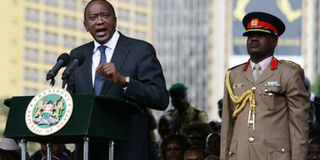President Kenyatta assures media freedom

President Uhuru Kenyatta addresses the nation May 1, 2013 during the Labour Day celebrations at Uhuru Park, Nairobi. President Kenyatta has media of press freedom in its watchdog role as guaranteed in the Constitution July 12, 2013. FILE
President Kenyatta has assured media of press freedom in its watchdog role as guaranteed in the Constitution.
In a meeting with editors in Nairobi, the President said his government considers the media as a “partner” in helping deliver its key promises to the people.
“We are not interested in government control and propaganda. Our commitment is to better ensure how the media can more effectively support our democracy by promoting prudent governance,” President Kenyatta said at State House, Nairobi Friday.
“What we want is openness and transparency that offers benefits to Kenyans. A free media is at the heart of true democracy. I am happy that in Kenya, we don’t even have a debate about free media anymore.”
The President who was meeting editors for the first time said his government would accept criticism from the media but added it would be important if journalists focused on issues that were of public interest.
Government-media interaction
The Editors were at State House to exchange views with the President on how the government and the media should interact. While the President said the relationship would “not be adversarial”, editors already had a bone to pick over the contents of the new Media Bill 2013.
According to the Editor’s Guild, the removal of the Media Council of Kenya Complaints Commission, granting of powers to Information Cabinet Secretary over the Council’s membership and the removal of media accreditation would jeopardise media freedom as enjoyed today.
If passed the way it is, it would mean that the media’s self-regulation would cease, the potential for quacks in journalism could increase and the syllabus taught in journalism schools could remain uncoordinated.
However, Information Cabinet Secretary Fred Matiang’i said the media would be invited to give their views on the draft law before it is passed.
“It is not our policy to muzzle the press. This government is committed to press freedom. It is our way of life," said Dr Matiang'i.
It was the first time in Kenya’s history that a sitting president had invited editors for exchange of views. But despite the gesture, Mr Kenyatta’s government has been largely secretive since it came to power three months ago.
A case in point was during the deportation saga involving controversial Nigerian Anthony Chinedu where Kenyan officials and their plane were held in Lagos for more than three weeks.
Initially, Foreign Affairs Ministry referred journalists to Interior Ministry before taking up the matter. But officials in both departments hardly answered questions from the media concerning the incident, and when the Kenyans were released, Foreign Affairs Secretary Amina Mohammed issued the confirmation on Twitter.
Lack of clear policy
The chairman of the Editors' Guild Macharia Gaitho lamented that there was no clear policy on who should be responding to inquiries from journalists and that most government officials have been reluctant to release information even if it is not sensitive.
“Mr President, I think a serious culture shift is necessary if we were to end this secrecy,” he said.
In response, Mr Kenyatta said the government would make a clear public communications policy in all ministries.
“All the ministries would be structured in a manner that there will be proper communication departments that is talking to itself but also communicating to the outside world in one consistent manner depending on who needs to be saying what,” Mr Kenyatta said.
“But we don’t remove the ultimate responsibility from either the president or the cabinet secretaries. Hopefully, as we go forward, some of the problems we have seen will disappear.”
The President also appointed Manoah Esipisu as Secretary for Communication and State House Spokesman.
Mr Esipisu, a former Commonwealth Spokesman takes over from Isaiah Kabira who moves to Australia as Kenya’s High Commissioner.
Mr Esipisu is a former Reuters journalist. In his role, the new Spokesman would also be in charge of managing the State House Press Centre that will soon be set up.




